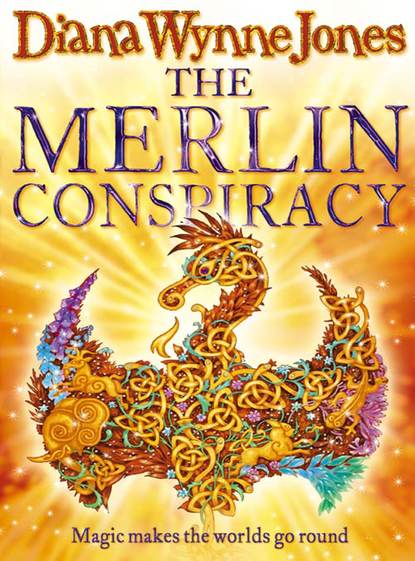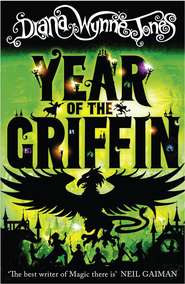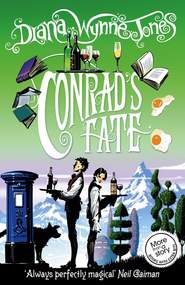По всем вопросам обращайтесь на: info@litportal.ru
(©) 2003-2024.
✖
The Merlin Conspiracy
Настройки чтения
Размер шрифта
Высота строк
Поля
He looked at me pityingly. “There are rumours, dear child. Or don’t you listen to gossip with your naïve little ears?”
“No,” I said. I’d had enough of his game, whatever it was. I turned, very politely, to Sybil. “Please would it be all right if I took Grundo to watch my father work?”
She shrugged her thick shoulders. “If Daniel wants to work in front of a staring child, that’s his funeral, I suppose. Yes, take him away. I’m sick of the sight of him. Grundo, be back here to put on Court clothing before lunch or you’ll be punished. Off you go.”
“There’s motherly love for you!” I said to Grundo as we hurried off into the rain.
He grinned. “We don’t need to go back. I’ve got Court clothes on under these. It’s warmer.”
I wished I’d thought of doing the same. It was so chilly that you wouldn’t have believed it was nearly Midsummer. Anyway, I’d got Grundo away. Now I just had to hope that Dad wouldn’t mind us watching him. He doesn’t always like being disturbed when he’s working.
When I cautiously lifted the flap of the weather tent, Dad was just getting ready. He had taken off his waterproof cape and was slipping off his heavy blue robe of office and rolling up his shirtsleeves. He looked all slim and upright like that, more like a soldier preparing for a duel than a wizard about to work on the weather.
“Over in that corner, both of you,” he said. “Don’t distract me or you’ll have the King after us in person. He’s given me very exact instructions for today.” He turned a grin on us as he said this, to show he didn’t at all mind having us there.
Grundo gave him one of his serious, deep looks. “Are we allowed to ask questions, sir?”
“Most probably not,” said my father. “That’s distracting. But I’ll describe what I’m doing as I go along, if you want. After all,” he added, with a wistful look at me, “one of you might wish to follow in my footsteps some day.”
I love my dad, though I never see very much of him. I think he really does hope that I might turn out to be a weather worker. I’m afraid I am going to be a great disappointment to him. Weather does fascinate me, but so does every other kind of magic too. That was true even then, when I didn’t know more than the magic they teach you in Court, and it’s more true than ever now.
But I loved watching Dad work. I found I was smiling lovingly as he stepped over to the weather table. At this stage it was unactivated and was simply a sort of framework made of gold and copper wires resting on stout legs that folded up for when we travelled. The whole thing folded away into a worn wooden box about four feet long which I had known for as long as I could remember. It smelt of ozone and cedarwood. Dad and that box went together somehow.
He stood beside the table with his head bent. It always looked as if he was nerving himself up for something. Actually, he was just working the preliminary magics, but when I was small I always thought that weather-working took great courage and I used to worry about him. But I’ve never lost the queer amazement you feel when the magic answers Dad’s call. Even that day, I gasped quietly as mistiness filled the framework. It was blue, green and white at first, but almost at once it became a perfect small picture of the Islands of Blest. There was England in all its various greens, except for the small brown stains of towns, with its backbone of the Pennines and its southern hills as a sort of hipbone. All the rivers were there as tiny blue-grey threads, and dark green clumps of woodlands – very important each of these, Dad tells me, because you bring the picture into being by thinking of water, wood and hill – but it still defeats me why I could even see the white cliffs in the south. And Scotland was there, too, browner, with travelling ridges of grey and white cloud crossing the brown. The fierce greyness at the top was a bad storm somewhere near John O’Groats. Wales lurked over to one side, showing only as dim greens under blue-grey clouds. But Ireland was entirely clear, living up to the name of Emerald Isle, and covered in big moving ripples of sunlight.
Dad walked round it all, bending over to look at the colours of the seas particularly. Then he stood back to see the patterns of the slanting, scudding clouds. “Hm,” he said. He pointed to the north-east of England, where the land was almost invisible under smoky, whitish mist. “Here’s the rain that’s presently being such a pest. As you see, it’s not moving much. The King wants it cleared up and, if possible, a blaze of sunlight when the Scottish King arrives. Now, look at Scotland. There’s very little clear sky there. They’re having sun and showers every ten minutes or so as those clouds ripple. I can’t get any good weather from there, not to make it last. Quite a problem.”
He walked slowly in among the green landscapes and the moving clouds, passing through the wires of the framework underneath as if they were not there. That part always gave me a shudder. How could a person walk through solid gold wire?
He stopped with his hand over dim, green Wales. “This is the real problem. I’m going to have to fetch the weather from Ireland without letting this lot drift in across us. That’s really appalling weather there in Wales at the moment. I shall have to try to get it to move away north and out to sea. Let’s see how the bigger currents are going.”
Up to his waist in moving, misty map, he gestured. The whole picture humped up a little and moved away sideways, first to show a curve of heaving grey ocean, ribbed like a tabby cat with strips of whitish cloud, and then, giddily, going the other way to show green-brown views of the Low Countries and the French kingdoms and more stripes of cloud there.
“Hm,” my father said again. “Not as bad as I feared. Everything is setting northwards, but only very slowly. I shall have to speed things up.”
He set to work, rather as a baker might roll dough along a board, pushing and kneading at clumps of cloud, steering ocean wisps with the flat of his hands, and shoving mightily at the weathers over Ireland and Wales. The dimness over Wales broke apart a little to show more green, but it didn’t move away. My father surveyed it with one hand to his chin.
“Sorry, everyone,” he said. “The only way with this is a well placed wind.”
We watched him moving around, sometimes up to his shoulders in land and cloud, creating winds. Most of them he made by blowing more or less softly, or even just opening his mouth and breathing, and they were never quite where you thought they ought to be. “It’s a little like sailing a boat,” he explained, seeing Grundo frowning. “The wind has to come sideways on to the canvas to make a boat move, and it’s the same here, except that weather always comes in swirls, so I have to be careful to set up a lighter breeze going the opposite way. There.” He set everything moving with a sharp breath that was almost a whistle and stood back out of the table to time it.
After a few minutes of looking from his big, complicated watch to the movements on the table, he walked away and picked up his robe. Weather-working is harder than it looks. Dad’s face was streaming with sweat and he was panting slightly as he fetched his portable far-speaker out of a pocket in the robe. He thought a moment, to remember that day’s codes, and punched in the one for the Waymaster Royal’s office.
“Daniel Hyde here,” he told the official who answered. “The rain will stop at twelve-oh-two, but I can’t promise any sunlight until one o’clock… Yes… Almost exactly, but it couldn’t be done without a wind, I’m afraid. Warn His Majesty that there may be half a gale blowing between eleven-thirty and midday. It’ll drop to a light wind around half past… Yes, we should have fine weather for some days after this.”
He put the speaker away and smiled at us while he put on his robe. “Fancy a visit to the Petty Viands bus?” he asked. “I could do with a cup of something hot and maybe a sticky cake or two.”
2 (#ub0833fe8-e8c4-5333-8c6e-7495778e46f9)
It was just as Dad predicted. We turned out for the Meeting of Kings in wet, howling wind that flapped velvet skirts and wrapped robes around legs. Those with headdresses held them in their hands until the last possible moment and then got very uncomfortable because, like the rest of us, they were trying to eat prettybread or pasties in one hand as we all went to our places. Sybil looked more dishevelled than anyone. Her yellow hair was streaming from her head and her hat was streaming green ribbons in her hand while she rushed about wailing cantrips and shouting at bad-luck carriers to get away behind the buses. She was barefoot, being an earth wizard, and she had kilted her velvet skirts up to her knees because of the wet in the grass. She had extremely thick legs.
“Looks just like a sack of sweetcorn balanced on two logs,” Dad said unkindly as he passed me on the way to the King’s tent. He disliked Sybil as much as I did. He used to say that it didn’t surprise him that Sybil’s husband had run away. And then he usually added, “They wanted the poor fellow to be the next Merlin, too. If it had been me, I’d have run away long before. Sybil and the worst job in the kingdom! Imagine!”
Unfortunately, Dad’s remark threw Mam into one of her rare fits of laughter and she breathed in a crumb of pastry. I was still thumping her back for her when word came round that the Scots were on their way. I had to run to my place beside Grundo. We were lined up with all the other children who weren’t pages in a row in front of the Royal Guards.
By this time, most of the tents were down except for the Royal Pavilion, and all the buses, vans, lorries and limousines were drawn up on three sides of an enormous square with the north-facing side left empty. The air was loud with the clapping of the household flags hoisted over them. The Royal Guards were drawn up inside that – poor fellows, they had been polishing kit and whitening belts since dawn, but they looked magnificent, a living line of scarlet and white. We of the Court were inside that again, like a bed of flowers in our Court clothes, shivering in the wind. Grundo said he envied the Household servants. They were allowed to stay in the buses and keep warm, and they had a much better view. They must have been able to see the Scottish Court advancing long before we could.
It was all timed perfectly. Hard-worked officials had been talking to one another on far-speakers all morning to make sure it was. The Scots appeared first. They seemed to come over the horizon and get larger and brighter as they came. They had pipers walking on both sides, solemnly stepping and skirling. I love the sound of bagpipes. It is the most exciting noise I know. I was quite sorry when our band started up and trumpets drowned the pipes out.
This was the signal for our King to come out of his tent and walk towards the Scots. When we stop in towns long enough for me to get talking to people, they always say enviously, “I suppose you see the King every day!” No. Actually, I don’t. He is nearly always away in the front of the Progress and I often don’t set eyes on him for weeks. When I do see him, it is usually like this, at a distance, as a tall figure in dark clothes, and the main way I recognise him is by his neat brown beard – and a sort of shiver of majesty he brings with him.
On this occasion he had Prince Edmund, the Prince Heir, with him too, also in sober, dark clothes. The Prince is eighteen now and he was travelling with his father that year to learn his duties. With them came the Merlin on one side and the Archbishop of York on the other, both old and stately in stiffly flapping robes, and after that a mixture of bishops and high officials and the wizards who are priests and priestesses of older powers. I’m supposed to know the order of them, but I keep forgetting. All I really know is that Sybil walked behind the Archbishop – with her skirts let down and her hat on by then – and my father was near the back, not being a priest.
I was looking at the Scots mostly anyway. Their King was quite young and he wasn’t the one I’d seen before. They have dozens of people who have claims to the throne of Scotland. Every so often, the clans back a new claimant, or three, and have a war and the King gets changed. This one, though he was new, didn’t look as if he’d get changed easily. He had a strong, eager look, and he walked as if he owned the earth, not just Scotland. He was wearing plaids, which made him stand out from the crowd of courtiers with him. They were very dressy. I have never seen so many styles and colours and French fashions. Their King looked like a hawk among parrots.
He left them behind and strode to embrace our King. For a brief minute, it was the friendliest possible Meeting. Prince Edmund was beckoned forward and introduced, and then a young woman in glorious rose pink silk who may have been the Scottish Queen – anyway the Scottish King grinned at her as if he knew her very well – and then it was the turn of the Archbishop and the Merlin to step forward and bless everyone. This was when the awful thing happened.
The Merlin spread his arms to call down benign magics. Dad says you don’t really need to spread your arms or do anything else physical to work magic. This is why he found Sybil so irritating, because she always acted about so, doing magic. But he says the Merlin had to show people what he was doing. So the poor old man held his arms up wide. His face, which was always rather pale, turned a strange colour. Even from where I was, I could see that the Merlin’s lips were sort of lilac-coloured where they showed through his white beard. He took his arms in hurriedly and hugged at himself. Then he slowly folded up and flopped down on the wet grass.
Everybody simply stared for an instant. And this was the instant that Dad’s fine weather arrived at last. The sun blazed out. It was suddenly damply, suffocatingly warm.
Dad got to the Merlin first. Dad had been spread out to the side when the two groups met and it only took him two strides to get there and kneel down. He swore to me afterwards that the Merlin was alive at that point, even though he had clearly had a bad heart attack. But Dad had to give way to Prince Edmund, who got there next. Prince Edmund put his hand out towards the Merlin’s chest and then snatched it back, looking aghast. He turned to the King and started to say something. Then he stopped, because Sybil swooped in almost at once and pulled the poor old man over on to his back. By that time he was definitely dead. I got a glimpse of his staring face among everybody’s legs and, as Grundo said, you couldn’t mistake it.
“Dead!” Sybil screamed. “My mentor and my master!” She put her head back so that her hat fell off and screamed again, towards the Scottish King. “Dead!”
She didn’t say any more. She just stood up with wet black patches on her velvet gown where she had knelt in the grass and stared at the Scottish King with her hands clasped to her chest.
Our King said icily to the Scottish King, “I believe Your Majesty was trained as a wizard?”
The Scottish King looked at him. After a moment he said, “I think this is the end of any friendship between us. I bid you good afternoon.”
He swung round in a swirl of tartan and walked away with all his people. He didn’t have to walk far. Vehicles came roaring over the brow of the hill almost at once, most of them military transports, and the royal party was scooped up into some of them, leaving the rest sitting in a threatening row on the Scottish border.
“We’ll move back a few miles,” our King said.
The rest of that week was a hot, moist chaos. Grundo and I, along with most of the children, were bundled here and there and sent about with messages because the royal pages were run off their feet, and it took us several days to find out what was happening.
It seemed that the media people had been filming the whole Meeting from their bus and they broadcast it as they filmed it. The Merlin’s death caused an outcry all over the country. The King had to go to the bus and assure people in another broadcast that it was an unfortunate accident, and that no one was accusing the Scottish King of anything. It didn’t help the situation that he said this in a grim way that made everyone think the opposite. At the same time, the whole Progress packed up double quick and moved south to the borders of Northumberland. The media bus was actually on the road while the King was grimly broadcasting. The rest of the buses had to keep drawing up on to the verges to make way for the army units rushing to take up defensive positions along the Scottish border, so all we knew of things were tilted views of hedges while green lorries thundered by in the road.
It turned out that the Scottish King broadcast too. He talked about an insult to Scotland and he sent army units to the border as well.
“But he must know it was simply an accident,” my mam said worriedly, when I did manage to see her and ask what was going on.
This was when we were finally camped around a village where the King could stay in a manor house that was big enough for the wizards to perform an autopsy on the Merlin. There, Grundo and I were sent hurrying with messages to other wizards, to the army HQ bus, the media tent, to the Waymaster’s Office and the Chamberlain’s, and after a day or so, to the village hall where the judicial enquiry was being held. So much was going on. There was a nationwide hunt for a new Merlin, with most of the wizards involved, while the rest were busy with the enquiry. It seemed that the post mortem had shown that there were traces of a spell hanging round the Merlin, but no one could tell what kind. It could even have been one of the Merlin’s own spells.
Dad was called into the enquiry. For a whole day, it looked as if he might be accused of murder. My heart seemed to be filling my ears and drumming in my chest that entire time. Mam went around white as a sheet whispering, “Oh, they can’t blame him, they can’t!” The trouble was, as she pointed out to me, everybody else who was close to the Merlin when he died was either royal or very important, so poor Dad got the full blast of the suspicion.
I can’t tell you how frantic everything was that day.











